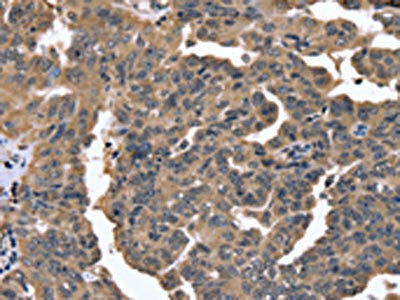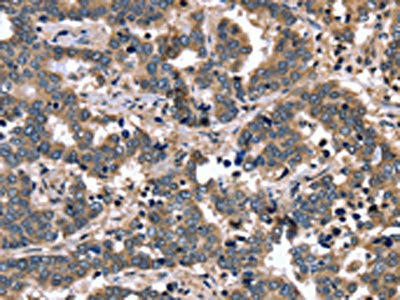Description
| Antibody Name: | FGFR1OP2 Antibody (PACO16343) |
| Antibody SKU: | PACO16343 |
| Size: | 50ul |
| Host Species: | Rabbit |
| Tested Applications: | ELISA, IHC |
| Recommended Dilutions: | ELISA:1:2000-1:5000, IHC:1:50-1:200 |
| Species Reactivity: | Human, Mouse, Rat |
| Immunogen: | Fusion protein of human FGFR1OP2 |
| Form: | Liquid |
| Storage Buffer: | -20°C, pH7.4 PBS, 0.05% NaN3, 40% Glycerol |
| Purification Method: | Antigen affinity purification |
| Clonality: | Polyclonal |
| Isotype: | IgG |
| Conjugate: | Non-conjugated |
 | The image on the left is immunohistochemistry of paraffin-embedded Human ovarian cancer tissue using PACO16343(FGFR1OP2 Antibody) at dilution 1/40, on the right is treated with fusion protein. (Original magnification: x200). |
 | The image on the left is immunohistochemistry of paraffin-embedded Human liver cancer tissue using PACO16343(FGFR1OP2 Antibody) at dilution 1/40, on the right is treated with fusion protein. (Original magnification: x200). |
| Background: | acid, c and basic fibroblast growth factors (FGFs) are members of a family of multifunctional polypeptide growth factors that stimulate proliferation of cells of mesenchymal, epithelial and neuroectodermal origin. Like other growth factors, FGFs act by binding and activating specific cell surface receptors which include the Flg receptor (FGFR-1) and the Bek receptor (FGFR-2), as well as FGFR-3, FGFR-4, FGFR-5 and FGFR-6. FGFR1OP2 (FGFR1 oncogene partner 2), also known as HSPC123, is a 253 amino acid, cytoplasmic protein that is expressed in spleen, thymus and bone marrow and is involved in wound healing under normal cellular conditions. Additionally, FGFR1OP2 may also exist as an aberrant fusion protein with Flg and it is thought that the FGFR1OP2-Flg mutant may play a role in the pathogenesis of stem cell myeloproliferative disorder (MPD). Multiple isoforms of FGFR1OP2 exist due to alternative splicing events. |
| Synonyms: | FGFR1 oncogene partner 2 |
| UniProt Protein Function: | FGFR1OP2: May be involved in wound healing pathway. A chromosomal aberration involving FGFR1OP2 may be a cause of stem cell myeloproliferative disorder (MPD). Insertion ins(12;8)(p11;p11p22) with FGFR1. MPD is characterized by myeloid hyperplasia, eosinophilia and T-cell or B-cell lymphoblastic lymphoma. In general it progresses to acute myeloid leukemia. The fusion protein FGFR1OP2-FGFR1 may exhibit constitutive kinase activity and be responsible for the transforming activity. Belongs to the SIKE family. 3 isoforms of the human protein are produced by alternative splicing.Protein type: Unknown functionChromosomal Location of Human Ortholog: 12p11.23Cellular Component: cytosolMolecular Function: protein binding; protein-tyrosine kinase activity |
| UniProt Protein Details: | |
| NCBI Summary: | |
| UniProt Code: | Q9NVK5 |
| NCBI GenInfo Identifier: | 74734519 |
| NCBI Gene ID: | 26127 |
| NCBI Accession: | Q9NVK5.1 |
| UniProt Secondary Accession: | Q9NVK5,Q6R955, Q8N5L7, Q9P034, Q9UFK8 |
| UniProt Related Accession: | Q9NVK5 |
| Molecular Weight: | 20,175 Da |
| NCBI Full Name: | FGFR1 oncogene partner 2 |
| NCBI Synonym Full Names: | FGFR1 oncogene partner 2 |
| NCBI Official Symbol: | FGFR1OP2 |
| NCBI Official Synonym Symbols: | WIT3.0; HSPC123-like |
| NCBI Protein Information: | FGFR1 oncogene partner 2 |
| UniProt Protein Name: | FGFR1 oncogene partner 2 |
| UniProt Synonym Protein Names: | |
| Protein Family: | FGFR1 oncogene partner |
| UniProt Gene Name: | FGFR1OP2 |
| UniProt Entry Name: | FGOP2_HUMAN |
| Antibodies |
| FGFR1OP2 Antibody (PACO09288) |
| Secondary Antibody |
| Anti-HRP Goat Anti-Rabbit IgG (H+L) Antibody (CABS014) |
| Recommended Products |
| Anti-FITC Goat Anti-Rabbit IgG (H+L) Antibody (CABS011) |
| Anti-HRP-conjugated Beta Actin Antibody (CABC028) |






